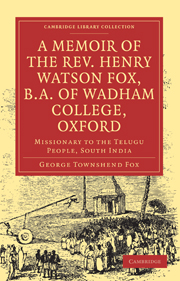 A Memoir of the Rev. Henry Watson Fox, B.A. of Wadham College, Oxford
A Memoir of the Rev. Henry Watson Fox, B.A. of Wadham College, Oxford Summary
After a short stay at Madras, Mr. Noble, my brother, and his wife proceeded to their post of destination, Masulipatarn (or Bunder, as it is also called by the natives), the chief town of the Telugu nation.
Masulipatam contains a population of 80,000, and lies on the coast, three hundred miles north of Madras, between the rivers Kistna and Godavery.
The first necessary object for both the missionaries was to acquire the native language. As soon as tolerable progress had been made in this, they directed their attention to different branches of missionary labour. Mr. Noble undertook the management of a school for the education of the upper ranks in Masulipatam, where a good English education is given, and the Bible is made a text-book of instruction. This school has continued to prosper to the present day, and Mr. Noble, without intermission, and in the enjoyment of good health, has been able to superintend it. This branch of operations might have been greatly enlarged, could more suitable teachers have been engaged from England. My brother undertook the office of preaching to the natives, both in Masulipatam and the surrounding country—in other words, the work of an evangelist to a heathen nation. But when it is considered that the nation contained ten millions of people, the idea seems almost preposterous, that one individual should have been suffered to go out singlehanded for such a work.
- Type
- Chapter
- Information
- A Memoir of the Rev. Henry Watson Fox, B.A. of Wadham College, OxfordMissionary to the Telugu People, South India, pp. 77 - 88Publisher: Cambridge University PressPrint publication year: 2010First published in: 1880
